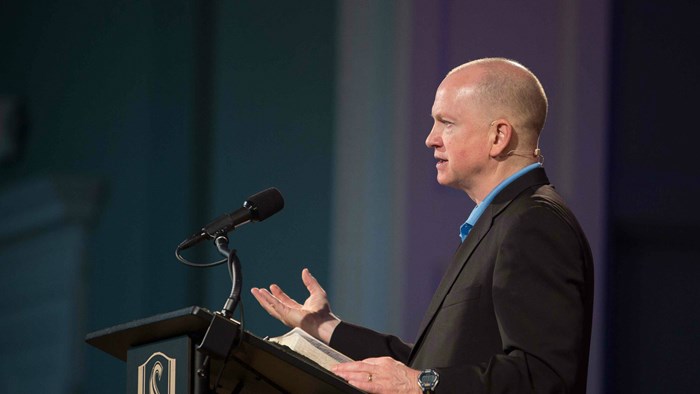
A campaign dedicated to eliminating discrimination against secular people has gained an unusual supporter.
Southeastern Baptist Theological Seminary president Danny Akin posted a 2-minute video for the site, which is dedicated to eliminating discrimination against atheists, freethinkers, agnostics, humanists, and nonreligious people.
“Evangelical Christians and secular people are not typically known for sticking up for each other,” the site said when introducing Akin’s video. “It comes down to respect.”
Akin said he wanted to reach out to the “nones,” the religiously unaffiliated who have shot up from 16 percent of the American population in 2007 to almost 23 percent in 2014, according to recent numbers from Pew Research Center. For the first time, “nones” outnumber every religious group except evangelical Protestants.
Akin’s support was “a significant statement,” Openly Secular chair Todd Stiefel said on the site. “I find it highly encouraging when Baptists and atheists speak out in support of one another. Secular people and evangelicals alike should treat each other with love and kindness. We certainly disagree on some issues, but we have more in common than many realize—including respect for and acceptance of our fellow human beings, no matter their belief system.”
CT asked Akin about his decision to support the campaign.
How did you get involved with Openly Secular?
Todd Stiefel, who is responsible for the website, lives in the community. We met about two years ago and began to build a relationship and friendship. He asked me to do a video that would be put on the website that affirmed peoples’ rights to believe or not believe and to hold their own views apart from discrimination and coercion.
I said, “Well, I’d be happy to do that.”
I’m a Baptist evangelical, and I’ve witnessed to him a number of times. We Baptist evangelicals are major advocates for religious liberty and freedom of conscience.
I told him, “To be honest with you, though you and I disagree very strongly about a number of issues, I’d put my life on the line for you to be able to believe or not believe what your conscience dictates.” He said, “We can both agree on that.”
What made you agree to his request?
I did say, “If you want my perspective on this, the future isn’t on my side. It’s on your side. You’re worrying about things you don’t need to be worrying about. I don’t think you’ll face opposition in our culture in the days ahead. It’ll be people like me that will face opposition, and I hope you’ll be singing the same song on my behalf that I’m doing for you.”
I’m not going to endorse the organization [Openly Secular], but I’m happy to do a video as an evangelical who believes we all have the right to religious liberty. That’s all I endorsed.
Have you received a lot of pushback?
A guy sent me an email today. He was critical but gracious, and he said, “I’m sure your inbox is blowing up.” Not really. I’ve received one complimentary letter and two emails that were critical. That’s three. That’s not very much.
Folks on the extreme of both sides have been critical, which makes me think I maybe came close to striking the right tone.
What are some issues that “nones” face?
I think they feel marginalized. They feel they are deemed dangerous, and they are viewed as the type of people that you don’t want to be your next-door neighbor.
They have so many misconceptions. If you ask most “nones” what a Christian is, I don’t think you’ll hear: “A sinner saved by the amazing grace of God who has a faith relationship with Jesus Christ who paid the penalty for their sins.” And whose fault is that? A perception that is faulty is still reality to the perceiver. I’m the one that has to help them overcome that bias and misunderstanding. That’s our responsibility, not theirs.
How can we build empathy with the “nones”?
Treat them with kindness and respect. Affirm our love for them as someone for whom Christ died. Why in the world would I not want to reach out to them, to be kind and loving? I’m never going to see an opportunity to share the gospel unless I build a relationship and establish some credibility.
[Image courtesy of Courtesy of Southeastern Baptist Theological Seminary]

Support Our Work
Subscribe to CT for less than $4.25/month


















